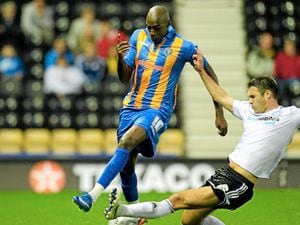Why gymnastics is now flying high - with pictures
It was up until quite recently that ‘British gymnastics’ was something of a contradiction in terms.
In 2003, Britain didn’t have a European champion, let alone a world champion, and it had been almost a century since an individual had come away with a medal at the Olympics.
Since then, everything has changed, with success story after success story at both an elite and grassroots level.
A record number of people, both young and old, are getting involved in the sport. Clubs across the West Midlands have large waiting lists. Thousands of youngsters enjoy recreational gymnastics and from that some go on to compete at the highest level.
More than 800 competitors filed into Telford’s International Centre over the two-day Spring Series event at the weekend.
Their aim was to qualify for the National Development Project finals or the 2018 British Championships.
Judging panels observed three events as competitors simultaneously took to the floor in the trampoline, tumbling and double-mini trampoline competitions.
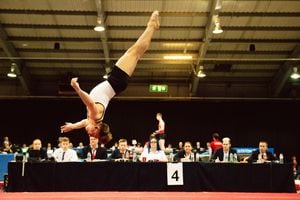
Kat Driscoll, Britain’s number one trampolinist, was supporting her club Apollo at the event. She said: “Everyone that’s here today are the best kids we’ve got in the country, standards are extremely high. We’ve had a pretty good day, for some of the gymnasts it’s their first time competing at this scale so they’re being supported by the more experienced ones.
“It’s a big adrenaline buzz, it feels like you’re flying through the air. There’s not many sports like that.
“You can train for hours and hours and hours but you get three routines of about 20 to 30 seconds each and that is it.”
Event organiser Emma Burton said there has been a steady increase in competitors over the last few years.
“It’s definitely growing,” she said. “Gymnastics is on the map as a sport with the success of the 2012 Olympics, it’s been growing in popularity.
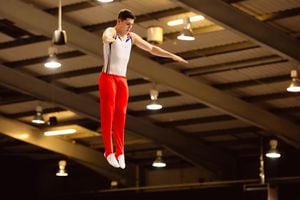
“There’s quite a few people here who have competed at the European and Senior levels.”
How did this amazing 15-year change come about? Experts say that it’s money, media and role models – and that the future is brighter than ever.
That’s good news for the Midlands. The home of English gymnastics is in Shropshire, close to the Staffordshire border, with the brightest and best coming to Lilleshall National Sports Centre to train. British Gymnastics also has its offices at Ford Hall, also at Lilleshall.
Dave Marshall, participation director for British Gymnastics, said demand was so high that one of its biggest priorities was ensuring there was enough spaces at clubs to meet demand.
“We’ve got more people taking part than ever before,” he said.
“Figures are showing record numbers of people who want to get involved. We’ve got a challenge in that we’re facing huge demand. There’s a lot of people on waiting lists. We’re looking to grow capacity to meet that demand.
“At the elite ends, we’re having more success than ever before.” In 1908 Walter Tysall won the men’s silver medal at the Olympic Games in London.

But we had to wait until 2016 in Rio for another male British gymnast to win an Olympic medal – Max Whitlock.
And it’s the success of modern gymnasts that is part of why its popularity is skyrocketing.
Dave said: “There’s quite a lot of reasons for the rise of gymnastics. Government funding has been coming into the sport, both to fund the elite end and grassroots.
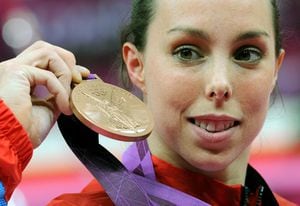
"British Gymnastics has worked hard to use that funding, especially at the Elite end. Those clubs that are producing those athletes have been using it as well.
“The most important thing for us was the breakthrough of people like Louis Smith and Beth Tweddle which raised the bar. They became role models for others in the sport to aspire to. Now you’re seeing the younger guys coming through.”
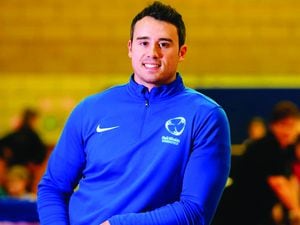
And many of our best gymnasts of recent years are turning their attention to coaching after they stop competing. Among them is Olympic gold medallist Kristian Thomas, who now trains at Telford’s Park Wrekin Gymnastics.
Dave said that youth development will hold Britain strong in the future. “The signs are good for British gymnastics,” he said. “We are having success across Europe and the world at junior levels as well. We’re in good hands for the future, and the athletes will keep coming and coming. We develop them at an early age, and then bring them into the elite levels to support the seniors.
“We have seen increased crowds at the events we run too. There’s more media interest across the TV. We’ve signed a deal with the BBC to get more TV coverage. That’ll provide more value and increase our profile.”
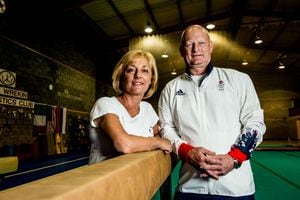
Salopians Colin and Christine Still have been at the centre of gymnastics for many years.
Colin coached Great Britain’s gymnastics team, while Christine provides commentary for the BBC. They have seen the rise of the sport over the last few years.
Colin got his start in Olympics life in 1984, when 14 Eastern Bloc countries boycotted the games.
He said: “Everybody works so hard. Nobody just gives away medals – you have to go out there and earn them.”



